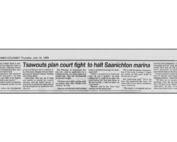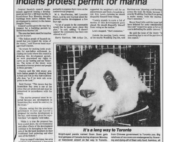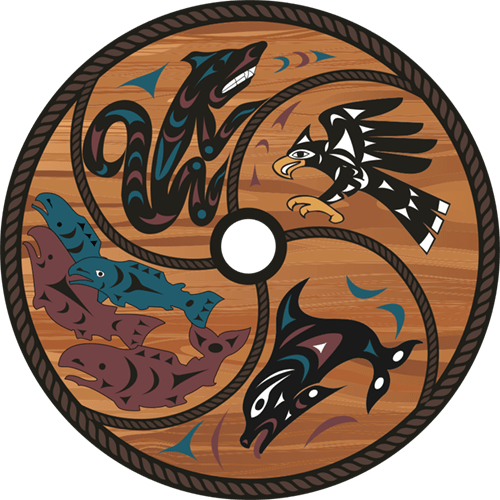The WLC’s Joni Olsen on the upcoming opportunities for business owners and skilled members of the community. Check out the interview or read the transcript below.
Joni Olsen:
Hi, everyone. Joni Olsen, Tsartlip First Nation band member, and I work for the Leadership Council as a policy negotiations analyst, and I’m doing a little bit of an advertisement today on one of the opportunities that the W̱SÁNEĆ Leadership Council is putting forward.
Interviewer:
Thanks, Joni. Can you please tell us how is the Leadership Council supporting small businesses and skilled community members?
Joni Olsen:
Right. So, a while back we created an artist protocol. It highlighted different artists in our community. Organizations would be able to log in and see profiles and then be able to connect with the artists. And we got some feedback that this should be available for not just our artists, but for other W̱SÁNEĆ community members that have businesses or skills.
Interviewer:
Can you tell us a little bit about the small business directory? Why would somebody want to add themselves to the directory?
Joni Olsen:
There are many organizations that want to be hiring and acquiring indigenous workers or businesses. They would come to us to say, “Do you know anybody who does excavating work or carving or graphic art of some sort?” Those types of things? Well, maybe we know someone, but that’s not a very fair process. Plus, we don’t know everyone. There are so many skilled W̱SÁNEĆ people out there that we want to be able to help advertise.
Interviewer:
Absolutely. And Joni, can you tell us a little bit about the micro-credential courses that are being offered to help small businesses and skilled individuals in the community get the certifications that they need in order to get access to these government contracts?
Joni Olsen:
Yes, the Island Prosperity Partnership is an organization that works, I believe, on the lower end of the island. They offer micro-credential courses. They are currently working with David Paul at the WLC to look into what kind of micro-credential courses would be useful. And then, of course, looking at what organizations are putting forward and what courses align with the jobs that are also being offered. What they’re most interested in doing is being able to bring those courses into the community so that they’re not courses that we need to travel far to be able to acquire these skills.
Another thing that the micro-credential courses do is, with our community members that, say, already have a business or already have a skill; it helps build capacity in the skills that you already have and create credentials that make you competitive in the market when you go to apply for contracts with one of the organizations.
Interviewer:
What do community members need to do in order to sign up for the business directory or for what they’d like to learn in these micro-credential courses?
Joni Olsen:
What you need to do in order to become part of the business directory or the micro-credential courses would be to look on the W̱SÁNEĆ Leadership Council’s website. Up at the top, there is an icon that says, “Get Involved.” Go to the Get Involved button, hit the icon, and you’ll see a link that says, “W̱SÁNEĆ business and skills directory,” and there’ll be a questionnaire attached to it that you can fill out. And that will make it so that we can say, “Here, let us have a look,” and we can give them a whole entire list of W̱SÁNEĆ members who have skills in those areas.
At the same time, under the Get Involved button, there is also another questionnaire, a micro-credential courses survey, and that survey is looking to identify the barriers that you feel are out there that are preventing you from being able to seek out some of these opportunities. By identifying the barriers, it’ll help us determine what kind of micro-credential courses would be better to bring into the community.
So, fill out both of the surveys, if you can, and we can help showcase your business or your skills. It doesn’t have to be a business.
Interviewer:
Is this similar to any programming that other nations are running?
Joni Olsen:
There are similar programs out there that other nations have been running. Malahat First Nation, for instance, when they put in the skywalk, they did some advertising for their First Nations’ businesses. And that way when guests would come and visit the skywalk, they could then have somebody stop in to look at some artwork or some of the other things that Malahat offers. It’s not exactly the same, but it helps the Malahat small business gain access to a little bit of a bigger market. That’s what this will do for you, is help you access a bigger market. So, there are other indigenous businesses that are out there that are registering to be able to get better access to the market.
Interviewer:
What would you tell anyone who’s considering adding themselves?
Joni Olsen:
So, what kind of skills do you have to have in order to market yourself with the W̱SÁNEĆ business directory? Really any kind of skill. Don’t underestimate the tiler, the painter, the small home repairs. Any kind of those skills, there’s a lot of opportunities out there. This will help you build your portfolio and help you advertise. It’s free advertising for you. This will be a really, really valuable resource for you moving forward. So, don’t underestimate your skill. If you want to advertise your business, this may not be for everyone. This is for those people who are looking to gain a bit more access to the broader market.
Just in closing. Thank you for watching this video. Please, once again, go to the W̱SÁNEĆ Leadership Council’s page and get involved. Put in your skills and help us help you advertise a little bit for you and businesses. So, thank you for watching.






